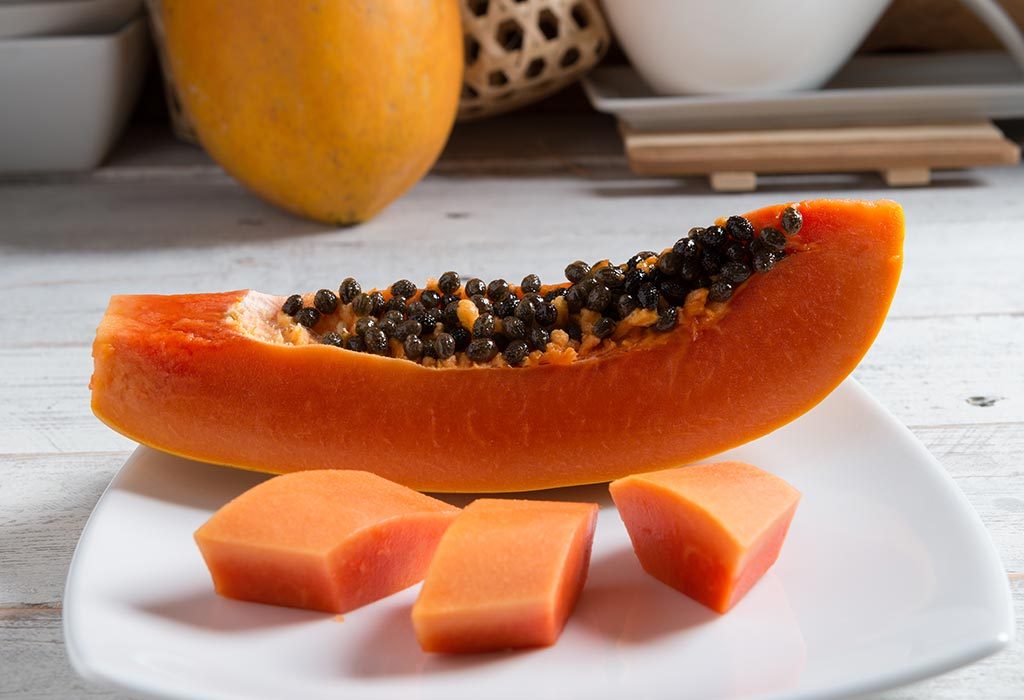In this Article
- Is Papaya Good for Breastfeeding Mothers?
- Health Benefits of Eating Papaya While Breastfeeding
- How Does Consuming Papaya Affect Milk Production
- How to Include Papaya in Your Diet While Breastfeeding
- Green Papaya or Ripe Papaya – Which is Better While Nursing
- Is Cooked Papaya as Beneficial as Uncooked One for Breastfeeding Moms
- When Should You Avoid Papaya While Breastfeeding?
- What Causes Papaya Allergy?
- Warning Symptoms of Papaya Allergy
Nursing mothers need to be just as careful about their diet as they were during pregnancy. They need to take extra precaution to consume balanced meals and a generous serving of fruits every day so that they lactate enough to provide the baby with the nutrients he/she requires. One fruit that is considered excellent for nursing mothers is papaya. Therefore, it is highly recommended by dieticians as a rich source of essential vitamins and minerals that enhance the quality and quantity of milk, and also helps in post-delivery recovery. Let’s take a look at the benefits of eating papaya for breastfeeding mothers.
Is Papaya Good for Breastfeeding Mothers?
Consuming papaya is safe during the final trimester and also after delivering the baby because of its high nutritional value. Despite its sweet taste, it is an excellent food option as it has low sugar content. Raw papaya is very good for lactating mothers. Just ensure you are not allergic to papaya and also consume it in moderation if you are not.
Health Benefits of Eating Papaya While Breastfeeding
Papaya is ranked as one of the most nutritious fruits to have for nursing mothers. The orange flesh of the ripe melon-like fruit is exceptionally nutritious, creamy and sweet, which makes it a favourite fruit for many. In many parts of the world, raw papaya is a common component in curries and stews and is also popular for its potential health benefits. Here are some major benefits of eating papaya while breastfeeding:
1. Prevents Heart Diseases
Papaya prevents cholesterol from building up in the blood vessels. It is rich in potassium and helps regulate heart rate and blood pressure. It reduces the chances of heart diseases and promotes a healthy circulatory system.
2. Helps With Post-Natal Weight Management
Papaya helps prevent cellulite development. It has a detoxifying effect and helps in burning fat. Being a low-calorie fruit, it contains no cholesterol and helps in weight management.
3. Boosts Immunity
Eating ripe papaya during breastfeeding is a very good option because of its health benefits. Fresh and ripe papaya has vitamin C, which is an immune-boosting agent. It has powerful anti-inflammatory properties which promote healing and prevent infections.
4. Boosts Milk Production
Papayas are known to have a lactogenic effect, which helps increase milk production in nursing mothers. Green papayas are more lactogenic, and hence nursing mothers should definitely try out different recipes incorporating green papayas.
5. Promotes Healthy Bowel Movements
Papayas contain dietary fibre which helps in preventing constipation and haemorrhoids. A regular intake of papaya can work wonders for the digestive system. It also lowers high cholesterol levels and regulates the blood glucose level.

How Does Consuming Papaya Affect Milk Production
Delicious papayas not only contribute as culinary treats but also have a range of health benefits to offer. Raw or green papaya increases the production of oxytocin – the hormone which regulates milk production in the mothers’ body. It also fortifies breast milk with its inherent vitamins and minerals.
How to Include Papaya in Your Diet While Breastfeeding
All mothers should understand that the health and growth of the newborn baby are completely dependent on the mother’s diet. Papaya, in fact, can bring in variety, flavour and health benefits which are required for your recovery and essential for your baby’s development. While you can eat ripe papayas either as it is or in a fruit salad, there are a few ways you could include raw papaya (green papaya) in your diet. It can be eaten cooked, raw or even as a curry. Here are some more ways you could include papaya in your regular diet.
- Green papaya curry: Green papaya can be cooked with some spices and made into a curry.
- Stir-fried Green Papaya – The raw fruit can be stir-fried in a tempering of your choice to make a quick side dish.
- Salad: Add some lime, salt, and pepper to grated raw papaya. To enhance the flavour, you could also add basil or mint leaves.
- Green Papaya Smoothie: A green papaya smoothie is a great breakfast recipe and can be made with papaya, spinach carrot, and yoghurt.
- Parathas: Just the way radish parathas are made, stuff raw papaya in some wholewheat dough and roll out parathas. These can be eaten along with your regular meal.
- Green Papaya Soup – You could prepare a fresh green papaya soup or can add the ingredient to fish and chicken soups.
Green Papaya or Ripe Papaya – Which is Better While Nursing
Ripe papaya tastes better than raw papaya, but from a medicinal point of view, raw papaya should be consumed by lactating mothers regularly. The enzymes and minerals are more concentrated in raw papaya; therefore, it is more healthy for nursing mothers.

Is Cooked Papaya as Beneficial as Uncooked One for Breastfeeding Moms
When we talk about uncooked papaya, we are essentially talking about raw papaya, which has a bland taste, unlike the ripe papaya. Most people avoid raw papaya for its unappealing taste, but cannot ignore it completely because of its nutritive value. They, therefore, prefer to cook it with other vegetables to make soups, stews, curries, stir-fry, or salads.
Also, many nursing mothers with a mild allergy towards papaya can consume cooked papaya safely. Cooking the raw fruit brings about a chemical alteration in the protein that causes an allergic reaction. Nonetheless, you must take medical advice to either treat the allergy or prevent an allergic reaction.
When Should You Avoid Papaya While Breastfeeding?
Though papaya is highly recommended to nursing mothers, one must bear the following points before consuming it:
- Do not consume papaya if you are allergic to it. The skin of papaya contains an enzyme similar to latex, which the body considers an allergen. One must promptly discontinue consuming papaya if any warning symptom is seen.
- Papaya should be consumed in moderate quantity. Excess consumption may lead to allergic reactions in young mothers.
What Causes Papaya Allergy?
Consuming papaya sometimes triggers severe allergic reactions in sensitive mothers. People with a latex allergy should either consult a doctor or avoid the fruit completely. The skin of papaya contains an enzyme which is responsible for allergic reactions. One needs to be extremely careful during the sensitive period of breastfeeding as it can directly affect the health of the nursing mom and indirectly spell danger for the baby too.
Warning Symptoms of Papaya Allergy
Papaya is known to be a wonder fruit because of its nutritional properties. But, if you see any of the warning symptoms mentioned below, you must quickly seek medical attention.
- Difficulty in breathing
- Itchy rashes wherever the skin touches the fruit
- Swollen lips
- Irritation in the mouth and the throat
- Diarrhoea and vomiting to eliminate the allergen
- Burning sensation along with inflammation of the oral cavity while eating papaya.
- Severe symptoms include obstructed breathing and fainting.
The lactating benefits that this delicious fruit makes it a favourite among nursing mothers. This nutrient-packed ‘fruit of angels’ is a great postnatal diet to provide complete nourishment to you and your baby. Unfortunately, not all mothers can have it; however, you may talk to your doctor and seek medical advice if you do want to give this fruit a try.
References and Resources:
- Momjunction
- Tinystep
- Mom365
- Beinghappymom









